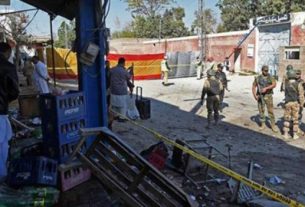WASHINGTON: The Hamas terrorist attacks and kidnappings in Israel that began Saturday appear to have at least temporarily put on hold a months-long U.S. public effort to mediate an Israeli-Saudi normalization agreement that would transform longstanding Mideast rivalries and alliances.
Asked about the U.S. mediation effort, Secretary of State Antony Blinken said in a series of appearances on U.S. Sunday talk shows that Biden administration is not currently focused on it.
Where does normalization process stand?
“Right now, in the immediate, the focus is on helping Israel deal with this attack from Hamas. That’s what we’re focused on,” Blinken told NBC’s Meet the Press program.
White House national security council spokesperson John Kirby echoed that view in remarks to reporters Monday but added that it was “too soon to say [that] we hit the brakes” on mediation.
Kirby had told reporters in a Sept. 29 phone call that progress toward an Israeli-Saudi normalization had been achieved.
“All sides have hammered out, I think, a basic framework for what we might be able to drive at,” Kirby said at the time. “But, as in any complex arrangement, as this will inevitably be, everybody is going to have to do something. And everybody is going to have to compromise on some things,” he added.
The Biden administration modified its language on that progress in an Oct. 4 State Department press briefing.
Deputy spokesperson Vedant Patel said: “many of the key elements of a pathway towards normalization are now on the table, and there is broad understanding of those elements. We’re certainly not going to get into the specifics of these diplomatic engagements publicly.”
The U.S. statements coincided with some of the most visible examples of that progress so far, namely Riyadh hosting visits by two Israeli government ministers in late September and early October to participate in international conferences. They were the first public visits of Israeli Cabinet-level officials to Saudi Arabia.
How Iran is responding to normalization progress
Iran’s Islamist rulers, who frequently call for the destruction of Israel, long have opposed Arab and Muslim nations establishing relations with the Jewish state.
In a report published Oct. 3, Iran’s state-run Press TV agency quoted Supreme Leader Ayatollah Ali Khamenei as telling an Islamic conference in Tehran that governments seeking normalization with Israel are “making a mistake and … betting on a losing horse.”
Khamenei’s senior advisor Ali Akbar Velayati issued a starker warning in remarks published by Press TV Monday. He said Hamas’ assault on Israel, which he praised as a success, should teach a lesson to “certain governments in the region” about what happens to those who follow Israel’s path.
Notably, Velayati and Khamenei did not cite Saudi Arabia by name. Tehran normalized its relations with Riyadh earlier this year, with both sides re-opening embassies in their respective capitals after a seven-year break in ties.
What US hopes normalization will achieve
In his Sunday talk show comments, Blinken acknowledged that the U.S. faces many “challenging” and “difficult” issues to resolve in its mediation effort, without elaborating.
If successful, Blinken told NBC an Israeli-Saudi normalization deal could have two main benefits.
One, he said, would be “a much different path for the region and for the future – a path of greater stability, of greater integration, of people working together to better their lives.”
Blinken said the other would be advancing and supporting the prospect of Israelis and Palestinians resolving their differences. “It’s imperative that [normalization] not be a substitute [for that resolution],” he said.
Why Saudi Arabia is pursuing normalization
Riyadh has emphasized that a normalization deal with Israel should include measures to improve the lives of Palestinians living under Hamas control in Gaza and in the West Bank under a decades-long Israeli occupation and an authority led by Palestinian President Mahmood Abbas, Hamas’ rival.
“For us, the Palestinian issue is very important,” Saudi Crown Prince Mohammed bin Salman told U.S. network Fox News in an interview published Sept. 20.
Referring to talks on a normalization deal, he said, “every day, we get closer” and expressed hope that negotiations will “reach a place, that it will ease the life of the Palestinians [and] get Israel [to be] a player in the Middle East.”
Asked by Fox News what would happen if Iran obtains a nuclear weapon as Western nations fear it seeks despite Iranian denials, Prince Mohammad told Fox News that “we will have to get one” as well. He did not specify whether that issue is part of the normalization talks with the U.S. and Israel.
There has been no public comment from Riyadh on whether the Israel-Hamas war will affect its approach to the negotiations.
How Israel views normalization effort
Israel indicated Sunday that it does not want any pause in efforts to reach a normalization deal.
“We don’t see any reason that it should be off the table,” said Israeli Ambassador to the U.N. Gilad Erdan in comments to reporters.
Israeli Prime Minister Benjamin Netanyahu gave an optimistic assessment of the normalization effort in a Sept. 22 address to the U.N. General Assembly. He said his nation was on the “cusp” of a peace with Saudi Arabia that would create “a new Middle East.”
“Such a peace will go a long way to ending the Arab-Israeli conflict. It will encourage other Arab states to normalize their relations with Israel. It will enhance the prospects of peace with the Palestinians. It will encourage a broader reconciliation between Judaism and Islam,” Netanyahu said.
But he also acknowledged the risk that, as he put it, “the fanatics ruling Iran will do everything they can to thwart this historic peace.”
Noting Iran’s longtime arming of Palestinian proxies such as Hamas, he urged the international community to “stop the curse of a nuclear Iran and roll back its fanaticism and aggression.”
Israel has not indicated what steps it might take to improve living conditions for Palestinians as part of a normalization deal. With Israel focused on a war to defeat Hamas, neither its government nor its main opposition parties have publicly discussed any such concessions.__VOA News





